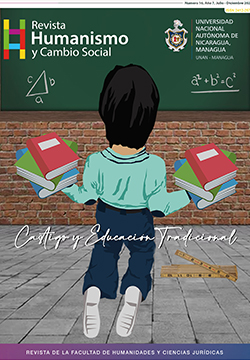Analysis of the growth of informal businesses in Nicaragua
DOI:
https://doi.org/10.5377/hcs.v0i16.10484Keywords:
Informality, commerce, labor informalityAbstract
Informal commerce is defined as a progressive activity established in different parts of society, without having a specific establishment to carry out its sales, being located in strategic places in the cities. According to an analysis of the determinants of labor informality in Latin America, it is established that 47% of employment is informal. This panorama allows us to analyze the relationship between the factors that motivate informality in business and the social coexistence that is generated in the municipalities of Estelí, Chinandega, Ciudad Sandino and Tipitapa as references for this analysis. These municipalities have commerce as one of their main activities in common; they are also municipalities with high population density, especially in urban areas, a favorable condition for the establishment of businesses since there is a greater demand. The Government of Nicaragua has implemented a series of programs and actions whose strategic logic is to facilitate the generation of new enterprises, improve the quality of existing ones, and facilitate the registration of businesses in order to reduce the informality gap. In Nicaragua there is a problem of informality in trade that has been a consequence of all historical stages. The main factors that determine the informality of businesses is the unequal economic growth that generates the need in a large sector of the population for self-employment, high unemployment rates, bureaucratic red tape, lack of rules and regulations or slight enforcement.
Downloads
References
Asamblea Nacional. (2014). Constitución Política de la República de Nicaragua. Retrieved Octubre, 2020 from Texto íntegro con reformas incorporadas a 2014: https://www.asamblea.gob.ni/assets/constitucion.pdf
Asamblea Nacional. (Julio de 2012). LEY No. 804. Obtenido de LEY DE REFORMA Y ADICIÓN A LA LEY No. 290, LEY DE ORGANIZACIÓN, COMPETENCIA Y PROCEDIMIENTOS DEL PODER EJECUTIVO: http://legislacion.asamblea.gob.ni/normaweb.nsf/b92aaea87dac76240625726
d21f7/436fd2fd6a181be0062a4800783cd8
Brenes, A., & Cruz, F. (2016). Determinantes de la informalidad en Nicaragua. Banco Central de Nicaragua, 111 152. Retrieved Octubre, 2020 from https://www.bcn.gob.ni/estadisticas/revista/trabajos_volIII/Brenes_y_Cruz_2016.pdf
DE SOUZA, M., & BUSTOS, A. (2017). EL COMERCIO INFORMAL DE CALLE EN LAS COMUNAS SANTIAGO Y CONCEPCIÓN. Redalyc, pp. 58-73. Retrieved Octubre, 2020 from https://www.redalyc.org/ articulo.oa id=19851049006
Formichela, M. (2004). EL CONCEPTO DE EMPRENDIMIENTO Y SU RELACION CON LA EDUCACION, EL EMPLEO Y EL DESARROLLO LOCAL. Buenos Aires: INTA. Rivadavia. Retrieved Octubre, 2020 from http://municipios.unq.edu.ar/modules/mislibros/archivos/MonografiaVersionFinal.pdf
Freije, S. (2001). El Empleo Informal en America Latina y el Caribe: Causas, consecuencias y recomendaciones de Poiticas. IESA, 49.
García, K., & González, Y. (2015). LA INFORMALIDAD DEL MERCADO LABORAL EN EL SECTOR COMERCIO DE MANAGUA 2009 -2013. Managua: UNAN-Managua. Retrieved Octubre, 2020 from https://repositorio.unan.edu.ni/3891/1/8012-Copiado.pdf
GRUN. (2017, Diciembre). Ejes del Programa Nacional de Desarrollo Humano 2018-2021. Retrieved Octubre, 2020 from https://observatorioplanificacion.cepal.org/sites/default/files/plan/files/Nicaragua.
EJES%20DEL%20PROGRAMA%20NACIONAL%20DE%20DESARROLLO%20
HUMANO.pdf
INIDE. (2018). INFORME DE EMPLEO ENCUESTA CONTINUA DE HOGARES (ECH) IV TRIMESTRE 2018. Managua: GRUN. Retrieved Octubre, 2020 from https://www.inide.gob.ni/docs/ECH_/Publicacion%20ECH%20IV%20Trimestre
%202018.pdf
Solá, R. (2007). UN SIGLO Y MEDIO DE ECONOMÍA NICARAGÜENSE: RAICES DEL PRESENTE. Managua: UCA: IHNCA. Retrieved Octubre, 2020 from http://repositorio.uca.edu.ni/3338/1/Un%20siglo%20y%20medio%20de%20
econom%C3%ADa%20nicarag%C3%Cense%20Las%20ra%C3%ADces%20del
%20 presente.pdf




